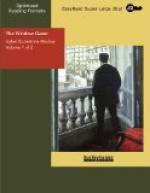All men have their secret fears and Professor Spence’s secret fear was embodied in a story which his friend and medical adviser (otherwise “Old Bones”) had seen fit to cite as a horrible example. It concerned a man who had sciatica and who didn’t take proper care of him-self. One day this man went for a walk and fell suddenly upon the pavement unable to move or even to explain matters satisfactorily to a heartless policeman who insisted that he was drunk. The doctor had laughed over this story; doctors are notoriously inhuman. The professor had laughed also, but the possible picture of him-self squirming helplessly before a casually interested public had terrors which no enemies’ shrapnel had ever been able to inspire.
Well, thank heaven it hadn’t happened yet! The professor confided his satisfaction to an inquisitive squirrel which swung, bright eyed, from a branch which swept the window, and, sitting up, prepared to take stock of the furnishings of his room. A grim smile signalled his discovery that there were no furnishings to take stock of. Save for his camp bed, an affair of stout canvas stretched between crossed legs, the room was beautifully bare. Not a chair, not a wash-stand, not a table cumbered it—unless a round, flat tree stump, which looked as if it might have grown up through the floor, was intended for both washstand and table. It had served the latter purpose at any rate as upon it rested the candle-stick containing the solitary candle by which he had got himself to bed.
“Single room, without bath,” murmured the professor. “Oh, if my Aunt Caroline could see me now!”
Oddly enough, something in the thought of Aunt Caroline seemed to have a reconciling effect upon Aunt Caroline’s nephew. He lay back upon his one thin pillow and reviewed his position with surprising fortitude. After all, Aunt Caroline couldn’t see him—and that was something. Besides, it had been an adventure. It was surprising how he had come to look for adventures since that day, five years ago, when the grim adventure of war had called him from the peace-filled beginnings of what he had looked forward to as a life of scholarly leisure. He had been thirty, then, and quite done with adventuring. Now he was thirty-five and—well, he supposed the war had left him restless. Presently he would settle down. He would begin his great book on the “Psychology of Primitive Peoples.” Everything would be as it had been before.
But in the meantime it insisted upon being somewhat different—hence this feeling which was not all dissatisfaction with his present absurd position. He was, he admitted it, a badly sold man. But did it matter? What had he lost except money and self-esteem? The money did not matter and he was sure that Aunt Caroline, at least, would say that he could spare the self-esteem. Besides, he would recover it in time. His opinion of himself as a man of perspicacity in business had recovered from harder blows than this. There was that affair of the South American mines, for instance,—but anybody may be mistaken about South American mines. He had told Aunt Caroline this. “It was,” he told Aunt Caroline, “a financial accident. I do not blame myself. My father, as you know, was a far-sighted man. These aptitudes run in families.” Aunt Caroline had said, “Humph!”




